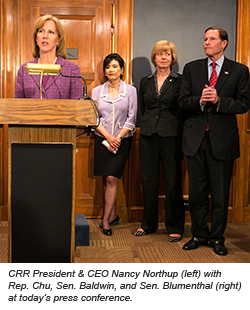History in the Making
The need for systemic change across the United States reproductive rights landscape has long been self-evident. In 2011, state legislatures passed more than 90 restrictions on access to reproductive health care. In the two years since, at least 100 more have become law, and what unfolded in the first half of 2013—the ferocity of the assault, the audacity behind such blatantly hostile laws—was staggering.
The collective voice of outrage and protest throughout our movement thundered loudly in response over the last few years, enough to be heard on Capitol Hill. In particular, Draw the Line supporters who signed the Bill of Reproductive Rights repeatedly called on lawmakers to finally address the attacks and provide federal protections for women’s access to reproductive health services.

And today, members of Congress responded emphatically. Senator Richard Blumenthal (D-Connecticut), Senator Tammy Baldwin (D-Wisconsin), Senator Barbara Boxer (D-California), Representative Judy Chu (D-California), Representative Lois Frankel (D-Florida), and Representative Marcia Fudge (D-Ohio) introduced a vital and historic piece of legislation entitled the Women’s Health Protection Act of 2013, sending a blunt message to extremist politicians nationwide.
After decades of relentless assaults on women’s rights and health, this act will outlaw existing, and prevent future, measures aimed at shuttering reproductive health facilities and imposing outrageous hurdles for women to navigate simply to access legal medical services—both of which have a devastating impact. These laws single out and target health care professionals who provide essential reproductive health care, undermining access to services and putting women’s health at risk.
You probably know of the kinds of laws we’re talking about—requirements that doctors to perform unnecessary tests and procedures, or adhere to outmoded and less effective medical regimens. Still more are what we refer to as TRAP laws—targeted regulation of abortion providers—which establish onerous requirements that do nothing to further women’s health and are designed solely to force providers out of practice. These laws must be stopped—all of them.
Coming out of the gate, the Women’s Health Protection Act has drawn deep and broad support, especially from members of Congress representing states like Arizona, Texas, and Wisconsin that have traditionally proven to be hostile to reproductive rights. But much work remains.
In the coming months, we will do everything we can to build support for the act at every level. That means we will be coming to you, asking you to send messages to your elected representatives in Washington and tell your friends why this legislation is so important and deserves their support.
We have long needed something that truly advances a woman’s health care—her right to make personal decisions about it and her ability to act on those decisions. We need a federal law that puts women’s health and rights first. The Women’s Health Protection Act does just that.
